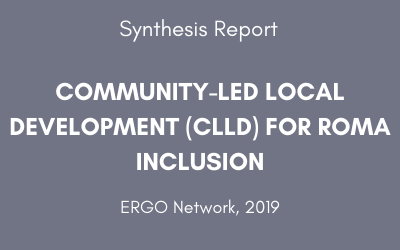ERGO Network members meet EC desk officers to discuss Community-Led Local Development
On 11 March 2021, the European Roma Grassroots Organisations (ERGO) Network facilitated an online exchange meeting between its national members in Bulgaria, Czech Republic, and Romania, and their counterparts in the country desks of DG Employment, Social Affairs and Inclusion (DG EMPL), DG Regional and Urban Policy (DG REGIO), and DG Agriculture and Rural Development (DG AGRI). Other European Commission staff responsible for related affairs was also in attendance.
The main topics covered in the meeting were:
- Presentation of the main findings of the ERGO Network evaluation report of the CLLD cycle 2014-2020 in the three countries.
- Updates on the possibility to introduce the Roma indicators in connecting the EU Roma Strategic Framework with EU funds.
- Updates on how to best feed Roma realities and proposals (particularly with a view to the pandemic and recovery) in the current MFF negotiations.
- Updates on the preparation of the National Roma Strategic Frameworks and National Recovery and Resilience Plans.
ERGO Network Director Jamen Gabriela Hrabaňová recalled that the organisation had been engaging extensively with CLLD processes since 2014, given the key role these processes can play in empowering Roma communities to identify bottom-up, beneficiary-led solutions that can tackle Roma poverty and social exclusion. Ms Hrabaňová pointed to the comprehensive synthesis report ERGO Network produced this year, evaluating the CLLD cycle for its entire duration (2014-2020) from a Roma perspective in three countries: Bulgaria, the Czech Republic, and Romania. She concluded by reassuring desk officers that ERGO Network national members and staff stood committed, willing, and able to provide all necessary input and feedback from their work directly at grassroots level, to make sure that the voice of the Roma was being heard.
- Access here the ERGO Network publication “Community-Led Local Development (CLLD) for Roma inclusion. Evaluation Report 2014-2020”
Daniel Grebeldinger, ERGO Network CLLD expert (Nevo Parudimos, Romania) offered participants a comprehensive presentation of the main findings of the evaluation report. Roma involvement in CLLD and Local Action Group structures remained unequal, while more work needed to be done to build the capacity of all actors involved – local authorities, other LAG members, Roma NGOs, and community leaders – to engage with these processes. Cooperation with the Managing Authorities was not always smooth, and delays in launching the calls and the evaluations persisted, making planning and delivering projects a challenge. While more and more local development strategies had included Roma as priority beneficiaries, further efforts were needed to ensure that interventions genuinely reached the Roma and made a difference in their lives, with their full participation. The ERGO Network report presents concrete recommendations for the Managing Authorities, for the LAGs, and for Roma communities themselves.
The presentation was followed by an interactive Q&A session with the European Commission representatives in attendance, where specific points of the report were further elaborated upon. After the opening plenary, participants split into breakout rooms according to countries, in order to be able to exchange bilaterally in more detail about specific national concerns. ERGO Network will continue to engage closely with CLLD processes on the ground, with a view to ensure that Roma rights, inclusion, and participation were prioritized in this framework. The dialogue with the European Commission will continue through follow-up exchange meetings.
- Access here the report of the online exchange meeting between ERGO Network national members and the European Commission (plenary only).





